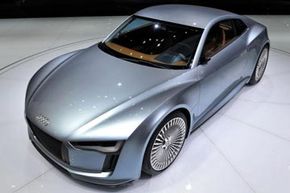For most hybrid drivers, the decision to ditch the gas guzzler for something a little more green is about lifestyle rather than economics. Operating on both electrical and traditional fuel, hybrids are able to avoid using gas for long driving periods by utilizing a battery-powered electric motor. This saves owners money at the pump, but not necessarily enough to justify the higher price tag that comes along with a Prius or Volt as compared to similar, less fuel-efficient vehicles [source: Helton].
Yet while gas is an increasingly significant cost of life on the road, it isn't the only one. Auto insurance can also set drivers back a pretty penny. Does driving a hybrid help cut costs on this end too?
Advertisement
Some big name auto insurers offer rate discounts for hybrid drivers. Travelers and Farmers, for example, give hybrid and alternative fuel vehicle drivers a 10 percent discount off while Geico shaves 5 percent off for eco-friendly motorists. Of course, these insurers aren't cutting rates based on some sort of high-minded altruism. Research shows that hybrid drivers pose a lower insurance risk than others because they drive fewer miles overall [source: Helton].
Nevertheless, as annual auto insurance rates range from less than $1,000 to more than $3,500, the hybrid discount could be significant. That is if it actually applied to the entire rate. The Travelers discount for hybrid vehicles doesn't count toward certain portions of coverage, such as uninsured motorist and personal injury protection ("no fault"), which are required by law in many states. Other companies also impose similar limitations [sources: Edgerton, Travelers].
The way in which a car is powered is only one of a number of factors that an insurer considers in calculating an auto insurance rate. Do hybrids offer other features that may help trim that rate? Read on to find out.
Advertisement



